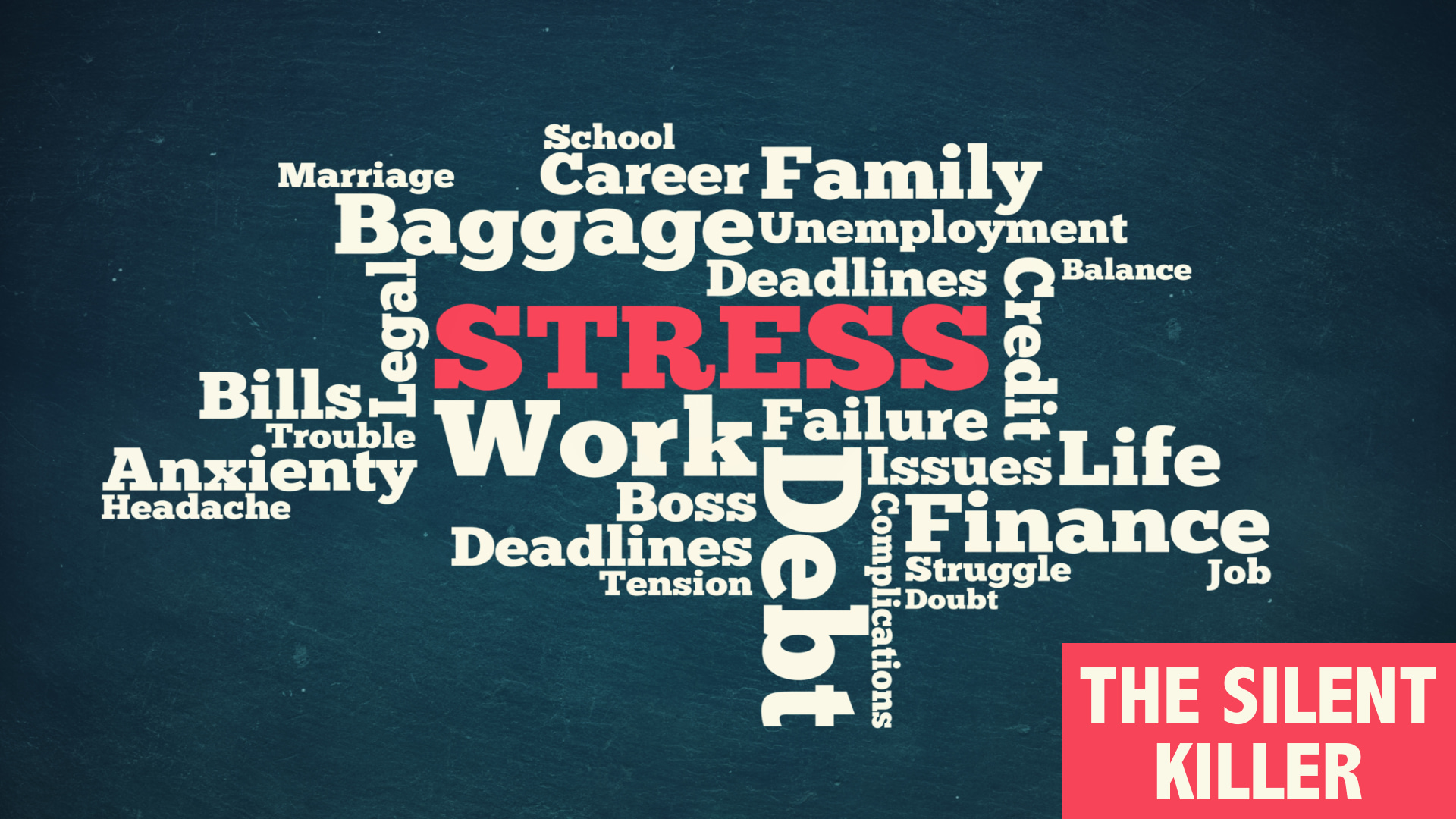WELCOME TO MY BLOG!
GOOD THINGS COME TO THOSE WHO SIGN UP!Receive powerful Coaching tips and tools. Free Coaching exercises. Master essential skills to help you live fully and enjoy life and relationships to the MAX!
Health Epidemic of the 21st Century
Part one began with an Introduction to Stress and provided an overview of the widespread terror that is also known as the SILENT KILLER.
Stress is the pervasive Health Epidemic of the 21st Century. Almost everyone we know will at some time come under the unrelenting control of stress. We face stress in all aspects of life from our personal to professional lives to the emotional stress we inflict on ourselves by overthinking, ruminating, and worrying.
Stress is unavoidable in modern society and as you continue to read, you will learn more about the havoc stress can reap on your life. I’ll also explore the different types of stressors that can trigger stress to increase your awareness, which is key to stress prevention, management, and overall well-being.
Stress Equals Bad News
There are numerous reasons to keep stress out of our lives.
- Stress is a significant contributor to the six leading causes of death: cancer, heart disease, lung conditions, accidents, liver cirrhosis, and suicide.
- Stress can speed up the aging process and chronic stress can lead to depression, diabetes, and cognitive impairment. Read more
- As a response to chronic stress, the body releases powerful hormones to the brain. Prolonged exposure can damage, shrink and kill brain cells.
- During stressful situations, your body releases a hormone called cortisol which causes abdominal fat to accumulate. It also enlarges individual fat cells and is why researchers brand it the ‘diseased’ fat.
- Stress raises blood sugar levels. Raised blood sugar is one of the precursors of diabetes. Exposure to stress causes a fight/flight/freeze response of the autonomic nervous system. The body cannot respond effectively to such situations if blood sugar is low. To rise to the challenge, so to speak, the body’s blood sugar rises, releasing stress hormones like cortisol and epinephrine (the latter also known as adrenaline). Adrenaline is the acceleration hormone that causes physical changes in your body such as elevated blood pressure and metabolism, faster breathing rate, and racing of the heart.
- Stress plays a role in high blood pressure, irregular heartbeat, reduced immune system response, erectile dysfunction, infertility problems, hair loss, and a multitude of health conditions and related problems.
Read more interesting facts about stress.
Now that we know the serious toll stress can take on our body, it begs the question…Why do we get so stressed?
Modern Lifestyle
Living in the 21st century has become the perfect breeding ground for Stress. Although most of us welcome the advancement of information and communication technologies, it comes at a very high price.
It seems the more we move towards an ‘on-demand-touch-of-a button’ society for our everyday wants and needs the more integrated these demands become into our mindset and lifestyles. Keeping all the balls up in the air is a prevalent feature and consequence that most of us are familiar with.
Modern living can make high demands of us and when the body becomes overloaded or overwhelmed, it shows up as stress.
Stress is certain to raise its ugly head when the unexpected comes knocking. Life-changing events such as a loss of a job, a serious diagnosis, trauma, or the death of a loved one are almost guaranteed to result in stress.
In the medical world, stress is defined as an alteration of the body’s homeostasis. (the equilibrium of internal bio-chemical mechanisms).
The Oxford Dictionary defines stress as ‘the state of affairs involving demands on physical or mental energy.
There are various situations, events, or conditions (also known as stressors) that can place huge demands on our physical, emotional, and mental resources that may trigger stress. But before we delve further it is worth mentioning that not all exposure to stress is adverse and the body’s healthy response to events produces the positive stress called eustress. When we face emergency situations such as racing to help at the scene of an accident, for example, our stress response (fight/flight/freeze response) can actually help, as it heightens the state of alertness.
Physical changes occur in the body. The pupils dilate to improve vision, the liver releases some of its stored sugar to increase energy, and sweat is produced to reduce the body’s temperature. The body is priming itself to meet the challenge and does so more effectively to handle the pressure in the moment.

Understanding the Distinction Between Acute Stress and Chronic Stress
Acute Stress
Acute stress is a short-lived, temporary, or single episode we come face to face with. When we are exposed to a real or perceived threat, challenge, or scare the body immediately responds and activates the flight/fight/freeze mechanism.
It is the immediate, intense, and in some cases ‘thrilling’ response that defines this type of stress as acute. Although the stressor (event) is short-lived and non-recurring, it is also a less serious form of stress and does not generally cause problems in healthy individuals. The stress diminishes once the situation is resolved.
Exposure to acute stress activates eustress as the body’s response and can be useful. In cases where a deadline is approaching, for example, stress gives an adrenaline rush and helps people to be more productive, motivated, and focused. For example, students who cram before an exam will likely experience eustress. Being involved in a car accident, or having to give a presentation at work, we can thank eustress for getting us through the ordeal.
Severe acute stress however is much more serious and can negatively impact our health. It can lead to conditions such as mental illness, physical problems, and post-traumatic stress disorder.
Chronic Stress
We want to avoid this form of stress at all costs. Chronic or long-term stress is the body’s response to an unresolved situation that has continued over an extended period of time.
This form of stress results in the prolonged elevation of cortisol levels in the body and is linked to very serious health conditions such as heart disease and stomach ulcers. Chronic stress can also lead to depression and more serious mental health conditions.
This type of stress is experienced as a result of a traumatic childhood and emotional or psychological scarring. Ongoing illness of a family member or long-term care of a disabled or elderly relative are examples of stressors that can bring about chronic stress.
Stressors are the ‘events’ that bring about or ‘trigger’ stress. Let’s explore.
Stressors (Events ) and Triggers
Stressors are the events or conditions in our surroundings that can trigger stress. Having an awareness of what they are and how they show up in our life is the first step to eliminating or reducing harmful stress.
Four main areas that trigger your stress response
- Social Stressors
- Physiological Stressors
- Psychological Stressors
- Chemical Stressors
Social Stressors
These are stressors that stem from relationships with others and the environment and present as life events and personal conflicts. They include but are not limited to:
- Working long hours
- Too much responsibility at work
- Being in a long-term unhappy relationship
- Winning the lottery
- Facing a serious health diagnosis /treatment
- Extended traveling/commuting, either in traffic or on a plane
- A new baby or getting married
- Caregiving to a disabled or elderly relative
- Divorce
- Loss of employment
- Finances
Physiological Stressors
Stressors that expose you to pain, vigorous exercise, intense heat, or cold. They can show up as the physical wear and tear on the body. They include but are not limited to:
- Excessive walking
- Excessive exposure to cold or hot weather such as a homeless person in winter
- A broken leg after an accident
- Obesity
- Long exposure to excessive noise
- Excessive cycling or extreme physical exercise
- Excess lifting of heavyweight such as an in the construction industry
- Physical fighting
- Sleep deprivation
- Physical Trauma
- Infection
Psychological or emotional Stressors
This stressor causes the emotional response of sorrow, fear, anxiety, etc. They include but are not limited to:
- Emotional childhood abuse
- Death of a loved one
- Dysfunctional or chaotic home environment
- A sibling or parental separation
- A violent or abusive marriage
- Parental rejection
- Being the victim of long-term bullying
- Confusion about sexual identity
- Lack of cultural identity
Chemical Stressors
Arterial blood imbalance or acid imbalance (too low or high Ph) are stressors that can trigger stress. They include but are not limited to:
- High sugar and junk food
- Caffeine drinks such as coffee
- Oral medication
- Nicotine found in cigarettes
- Chemical pollutants in the environment
In this blog, we looked at the effects of stress, and stressors that trigger stress. Your new learning will serve to identify stressors and deepen your understanding of the harm stress can cause to your physical and mental well-being. Next, we’ll take a dive into Stress Prevention and Stress Management in Part 3 of this series on Stress.
A crucial factor in the management of stress is self-care. When was the last time you checked in with yourself and indulged in some loving care and kindness? Use this FREE Coaching Tool: SELF-CARE CHECK-IN AND NEEDS REVIEW to assess where you are at in terms of your self-care practices.
Stay tuned for part 3 of my mini-blog-series on Stress, and in case you missed it, click here for Part 1.
With grace and gratitude
Michelle

Michelle Williams
Life and Couples Coach
I love hearing from you, let’s connect on Social Media.
CHANGE STARTS WITH YOU!
I use evidence-based tools and skill-building techniques to help you get unstuck. To break free from destructive or limiting thought and behavioral patterns that are holding you back. As your Coach I will support you to find your voice so that you may thrive and find the happiness and peace you deserve.
Schedule your FREE session with me today!
Share your thoughts!
You may also like…
FREE COACHING RESOURCES
and weekly inspiration

FREE REPORT
Start Creating a Life You Truly Love
Sign up to get access to five Strategies for Living Happily Ever After!

STAY INSPIRED
Get weekly feel-good quotes
Quotes that motivate, inspire, and remind you of how beautiful you are and wonderful life can be!

FREE REPORT
Plus SPECIAL BONUS INSIDE
Take the Relationship Assessment to help identify your strengths and weaknesses and set goals for a more fulfilLing relationship.
Let’s connect on YouTube

STAY INSPIRED
DEEPEN AND CELEBRATE YOUR LOVE ❤

0 Comments